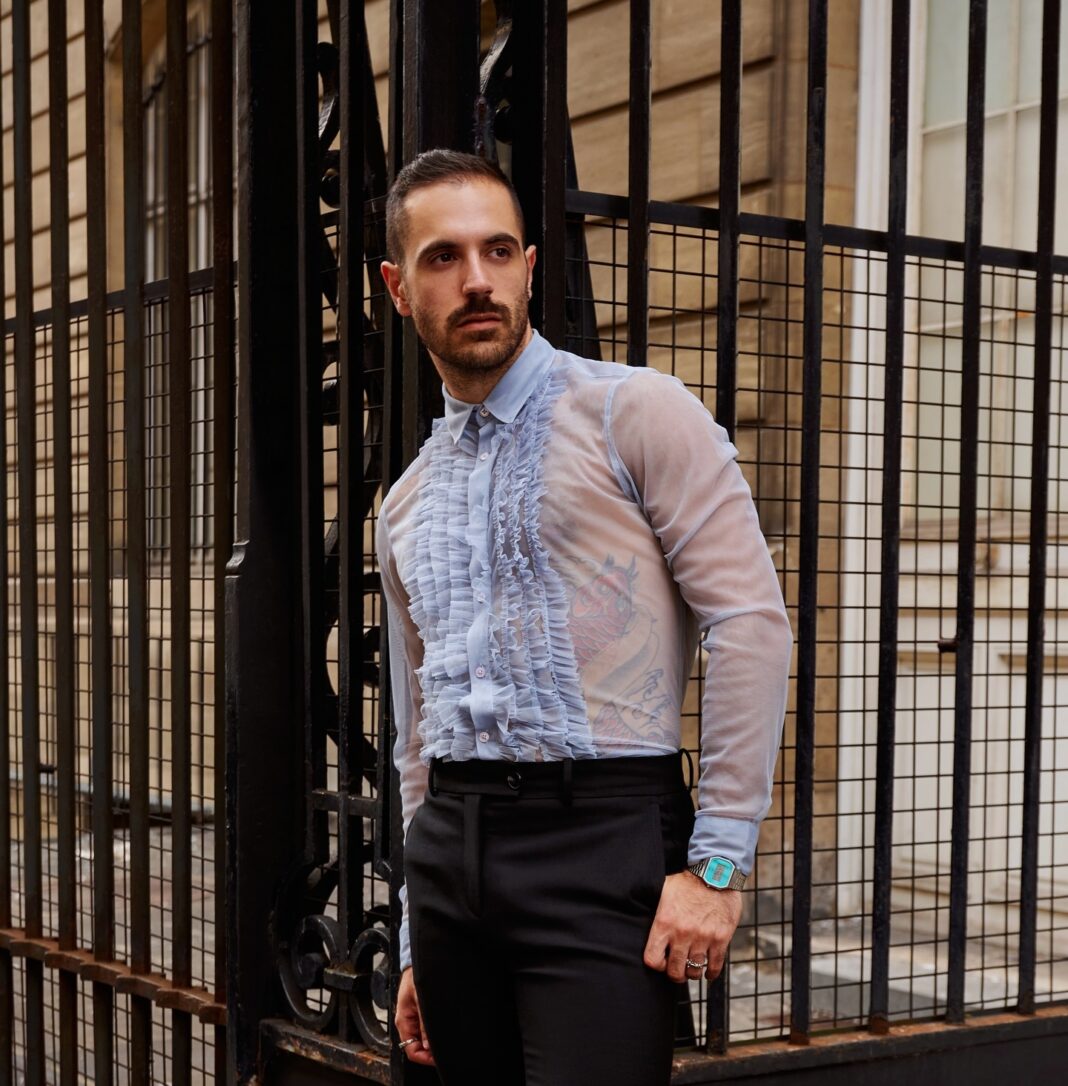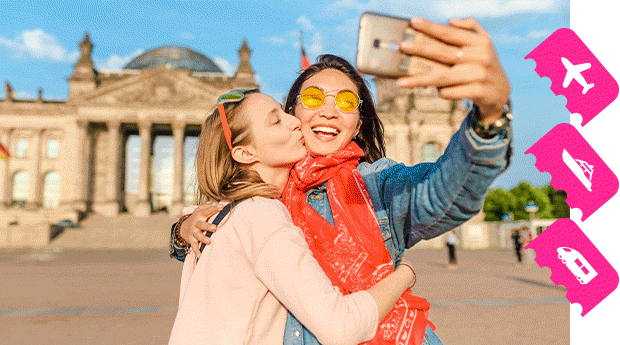Kosta Karakashyan has truly hit his stride. Prior to 2023, the talented artist and activist already had an enviable career as a choreographer and director, working with brands and luminaries including Calvin Klein, H&M, MNEK and Rita Ora. However, he can now add “diplomat” to his resume as well. For the 2023/2024 mandate, Karakashyan is one of two newly elected Bulgarian youth delegates to the United Nations, tasked with advocating for cultural and educational access for his fellow young citizens.
Diplomacy is new for Karakashyan, who usually prefers stirring the pot to quiet negotiations. Still, in addition to visiting the U.N. next year to deliver an address on issues facing Bulgarian youth, he hopes to forge new relationships between LGBTQ+ organizations and his Bulgarian delegation.
While he can’t, for the time being, call out Bulgaria for its perceived flaws, he can use his newest platform to do some good. In addition to visiting the U.N. next year to deliver an address on issues facing Bulgarian youth, he hopes to forge new relationships between LGBTQ+ organizations and his Bulgarian delegation. He’ll likely use the platform, along with his other creative work, to address topics like mental health, the climate crisis and the lives of queer people in Eastern Europe.
Karakashyan, recently selected for Forbes Bulgaria’s “30 Under 30,” has been a role model for queer Bulgarians ever since he came out on national television in 2019 while promoting Waiting for Color, a documentary dance film about the persecution of LGBTQ+ people in the Chechen Republic of Russia.
Despite his pointedness, he loves his pad in Sofia, Bulgaria, and has lots to say about Bulgaria, a European Union member with a population of about 6.878 million. Bordering Romania, Turkey and Greece, among others countries, it has a mountain interior and a Black Sea coast dotted with resort towns. We caught up with Karakashyan to learn about Bulgarian culture and to hear his local travel recs.
What would you say queer youth in Bulgaria need most right now?
The biggest challenge is the lack of structural support for queer people. The new generation is growing up very confident in who they are and how they want to be accepted in society. But we still have a lot of work to do with the laws, to make sure that the human rights of all queer people are protected and that they have the same quality of life as straight people. In Bulgaria, we have a lot of legal challenges because the constitution still defines marriage as a union between a cisgender man and woman.
We recently had a big case with a trans woman who was denied having her documents changed. She went on a hunger strike in front of the Sofia Court of Justice for almost a week. So we are in this very interesting territory where the laws haven’t caught up with the spirit and the desires of this generation of queer people.
What’s one misconception foreigners have about your country?
I’ve heard both sides. Some people say everyone in Bulgaria is so rude—that’s a misconception. Then others say people in Bulgaria are the friendliest you will ever meet. Both of those are sometimes true and sometimes not. [Laughs.] Because Bulgaria is a smaller country relative to other European Union member states, some people are very flattered when tourists come to Bulgaria. You’ll definitely meet people here who are very eager to help you out and show you around and just make sure that you have a good experience.
Bulgaria is known around Europe for its beaches. What’s your favourite coastal area?
My favourite seaside town to visit is Sozopol, a charming old town with a quaint atmosphere. It’s more picturesque than the big resorts and has a selection of guesthouses and art hotels, as well as options for nightlife. Sozopol is great for a more introspective trip, where you want to soak up the local vibe. You can also take a day trip to the nearby Castle of Ravadinovo (Ravadinovo, Sozopol), which has a lake and a flower garden. Another great thing about the Bulgarian seaside is that you can hop amongst the different towns if you get bored, because there are so many towns and villages along the coastline.
The country has a lot more to offer than just seaside resorts and hotels and clubs. There’s a lot of beautiful history and interesting sites to see, like communist monuments, museums. The Balkan Mountains are amazing. You can go skiing there in the winter. I’d also recommend The National Museum of Natural History (Tsar Osvoboditel Blvd. 1, 1000 Sofia Center, Sofia).
It’s quite an ancient country, so there are lots of prehistoric things to see, like the Roman amphitheatre in my hometown of Plovdiv. (The Ancient Theatre of Philippopolis, Tsar Ivaylo St. 4, 4000 Tsentar, Plovdiv.)
What are the best things for visitors to do while in Sofia?
For Sofia, a perfect day includes grabbing a coffee at Coffee Syndicate (Moskovska St. 3, 1000 Sofia Center, Sofia) or Kolichka (San Stefano St. 9, 1504 Sofia Center, Sofia). Then check out the Free Sofia Tour (which starts at the Palace of Justice, Vitosha Blvd. 2, 1000 Sofia Center, Sofia). Listen to some jazz at Zh Jazz Room (Tsar Simeon St. 49, 1000 Sofia Center, Sofia) or Ganci (ul. Pordim 1, 1202 Sofia Center, Sofia), two of the coziest spots in town. Then finish with dinner at Cosmos Restaurant (Lavele St. 19, 1000 Sofia Center, Sofia) and rooftop drinks at Sense Hotel (Tsar Osvoboditel Blvd. 16, 1000 Sofia Center, Sofia) or The Hyatt Regency (Vasil Levski Blvd. Square, 1504 Sofia Center, Sofia).
For museums and galleries, Kvadrat 500 (ul. 19-ti fevruari 1, 1000 Sofia Center, Sofia) is the newest building of the National Gallery, which features Bulgarian art from the mid-19th and 20th centuries, European art from the 15th to 19th centuries, and art exhibits from Asia, Africa and America. Then take a trip to Little Bird Place (ul. 11-ti avgust 7, 1000 Sofia Center, Sofia), one of my favourite modern and contemporary art galleries in town with a focus on nature, biological diversity and ecology.

What Sofia nightclubs do you recommend?
The first one is, of course, The Steps (Bratya Miladinovi St. 12, 1000 Sofia Center, Sofia), which is a social enterprise and a nightclub for LGBTQ+ people. I’m involved with it. They have different parties.
There’s another bar that’s a bit more alternative called Tell Me (ul. Ivan Vazov 12, 1000 Sofia Center, Sofia). It’s very queer, a bit more electronic, a little bit more alternative.
Then there’s Koncept Space (bul. Nikola Y. Vaptsarov 6, 1407 g.k. Lozenets, Sofia). They sometimes do drag shows there that are also a bit more … I don’t want to say alternative, but it’s not mainstream RuPaul drag. It has more of an intimate, authentic vibe with local drag queens that are really passionate about it. It’s a space that’s not only for queer people. I really like the idea that this type of bar has a drag night.
What’s your favourite place to get food?
In Sofia, the place that I definitely recommend is Cosmos Restaurant (Lavele St. 19, 1000 Sofia Center, Sofia). It’s a very contemporary restaurant, a little bit upscale, that mixes traditional Bulgarian cuisine with some more interesting techniques. My boyfriend is a creative director there. It’s amazing that the restaurant has a creative director position. They make quite an interesting experience for the customers. Now we’re working on a performance experience called “Expedition Euphoria.” We take the guests on a trip to different planets in the restaurant. Each planet will have different native people that come and tell about what that planet is like. And then you get to sample the food from that “planet.” We just started rehearsing for that.
You’re providing choreography and direction?
Yes. We’re gonna probably do it at least a couple of times in the next year.
Outside of Sofia, what’s one town or city in your country that you love?
I have a love-hate relationship with my hometown, Plovdiv, the country’s second-largest city, which is just an hour away from Sofia. I don’t go there so often because I think we tend to see the place where we grew up as something very mundane, right? But then, everyone who visits Plovdiv is really enamoured by the architecture. It’s called the Town of the Seven Hills—it used to have seven hills. It’s quite picturesque. There are only a few hills left, but you can very easily hike up some of them and see the town. It also has a lot of Thracian ruins, Roman ruins.
Plovdiv is also a cultural hotspot for a lot of different types of arts. There’s an artsy area, Kapana, which has all the trendy new cafés, bars and galleries—a nice Brooklyn-esque vibe. Check out 5 o’clock (ul. Rayko Daskalov 54, 4000 Tsentar, Plovdiv). The trendiest restaurant is Pavaj (ul. Zlatarska 7, 4000 Kapana, Plovdiv).
I’m not familiar with Bulgarian cuisine. What’s the dish most foreigners take to immediately?
First, Bulgaria is known as the home country of yogurt. The bacteria that makes milk into yogurt is called lactobacillus bulgaricus—it’s named after Bulgaria. Everyone is very proud.
We also make this cold yogurt soup, tarator. It’s made from yogurt, chopped cucumbers and crushed walnuts. You can also put some parsley and some spices in it. It’s very refreshing for the summer, very hydrating.
The other dish that people love can be a breakfast food or it can be a snack or a hangover cure. It’s a phyllo dough pastry called banitsa. You take some cheese and some butter and eggs, roll it all in the phyllo dough and then bake it. It’s delicious. There’s different types of banitsa, different shapes, different fillings. You can get it at any street corner or you can make it at home. For New Year’s, it’s a big tradition where in each piece of pastry, you put different good luck charms. So when you break the big pan, everyone gets a different piece of luck for the New Year.
For people who are interested in a nature experience, is there a particular park or beach you’d recommend in Bulgaria?
One place that is very famous is the Seven Rila Lakes, which is in one of our mountain ranges, the Rila. There’s a full-day tour from Sofia. You get to hike up to these seven lakes that are all super beautiful.
What’s the best time to visit Bulgaria?
Late spring is quite nice, before all the tourists get here. April, May, even early June would be great. July and August get too crazy, which is kind of a trend with any warm place. The prices are cheaper during the off season.
This interview has been edited for length and clarity.


